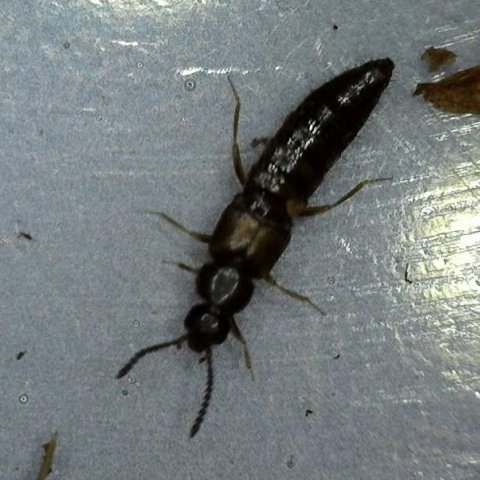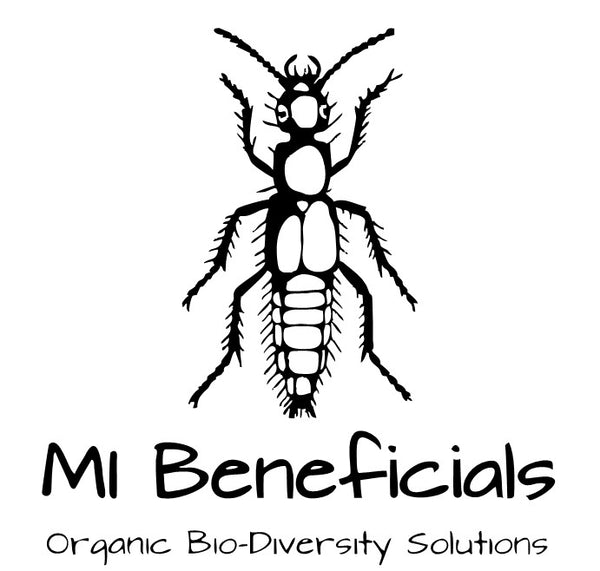
Rove Beetles (Dalotia coriaria) in Living Soil
Mark AshworthShare
The Rove Beetle (Dalotia coriaria) is a species of soil-dwelling beetles which feeds on fungus gnats, thrips. Some studies have shown that in conjunction with Hypoapsis miles, they can also provide some level of protection against root aphids. They're also detrivores and will consume organic matter, aiding in the decomposition process and helping to cycle nutrients for your plants.
Looking to add Rove Beetles to your garden? We carry them here!
Identification:
The larva are light brown to dark brown in appearance and are more worm-like, while the adults are 3-4 mm long and dark with a slender body and wings. The wings allow them to mobilize from container to container in a grow room and from area to area in an outdoor environment, to attack where pests are prevalent. These wings allow them to establish quickly in their introduced environment as well.

Purpose:
Rove Beetles (Dalotia coriaria) are both a carnivorous as well as detrivirous
Habits:
Rove Beetles (Dalotia coriaria) quickly move throughout the rhizosphere and mulch layers in a living soil container. Since the larvae are quite photosensitive they will only be observed after quickly peeling back mulch or cover layer and then will quickly recede. The adults are quick moving and hard to spot as well, but less photosensitive than the larvae.
The adult, larval and pupal stages of Rove Beetles are all ferocious eaters, consuming between 10-20 pest larvae per day. In the absence of pests, they will consume Springtails (Collembola) and soil mites.
It is common for Rove Beetles to go completely unnoticed, especially in the first 17-28 after introduction. This is when they are establishing their new homes in your container and going through the process of reproduction.
Their appeal in a commercial setting is high because of their resiliency to many chemical insecticides and bio-insecticides. Horticultural oils (including neem and azadirachtin), Beauveria Bassiana, kinoprene and organic oils have no effect on Rove Beetles.
The perfect diet for both your plants and Rove Beetles does exist... it's called Beneboost and it's 100% organic and has tons of plant and beneficial soil insect benefits. Check it out here!
Life Cycle:
Rove beetles have a relatively quick reproductive cycle which makes them an effective, regenerative means of pest control. Rove Beetles are laid as eggs in pupal chambers, constructed out of silk for protection. The 4 life stages of the Rove Beetle takes roughly 17 days from egg to adult. Their average lifespan is between 45 and 60 days, but in that time a female will lay roughly 90 eggs, with over 2/3 expecting to make it until adulthood. Their ability to procreate faster than decline truly defines regenerative.
Source: Kansas State University
Looking to Add More Bio-Diversity to Your Soil? Checkout our Living Soil Bio-Diversity packs which come loaded with Rove Beetles, Hypoapsis miles and other decomposing species to get your living soil bed kicked off right.
Read More About These Key Soil-Based Beneficial Insects
- Oribatid Mites (Oribatida)
- Rove Beetles (Dalotia coriaria)
- Stratiolaelaps scimitus (Hypoaspis miles)
- Springtails (Collembola)
- Red Wiggler Worms (Eisenia Fetida)
- Enchytraeidae (Pot Worms)
Checkout These Helpful Guides
- How To Release Your Living Soil Bio-Diversity Pack
- How To Manage Grey Potato Bugs in Living Soil Containers
- How to Make Sprouted Seed Tea with Blue Corn
- How To Use Coconut Powder in the Garden
- How to Use Aloe in the Garden
